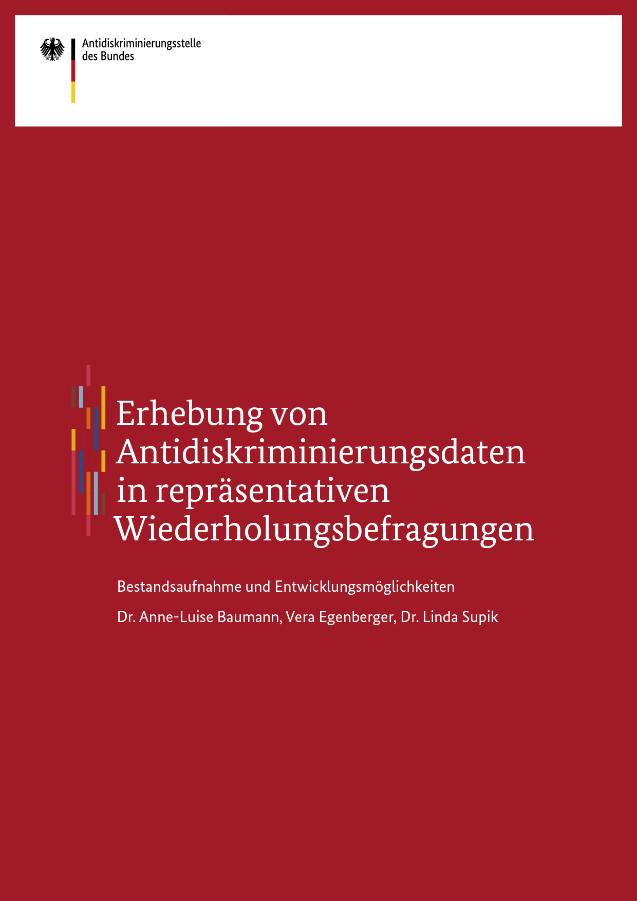Collection of Anti-discrimination Data in Representative Repeat Surveys
Stock-take and room for development
- Fact sheet on the research project -
Authors: Dr. Anne-Luise Baumann, Vera Egenberger, Dr. Linda Supik, published by the Federal Anti-Discrimination Agency (FADA) Year of publication: 2018
Brief overview
The expert opinion sets out to identify the discrimination-relevant questions and categories included in representative repeat surveys conducted across Germany. It covers both cross-thematic surveys (such as microcensus, socio-economic panel - SOEP) and more specific surveys (such as the German ageing survey "Deutscher Alterssurvey"). Based on these data, it evaluates existing approaches and flags data gaps. Finally, the expert opinion formulates recommendations specifying the ways in which discrimination reporting should be developed further to match the scope of protection enshrined in the General Equal Treatment Act (AGG).
Main results
Questions asking about subjective discrimination experiences or other aspects of discrimination
Most surveys already include questions asking about subjective discrimination experiences or other aspects of discrimination. However, the picture remains incomplete:
- In some instances, questions to that effect are only asked of certain subsets of persons (such as migrants) or they only look at discrimination on grounds of given characteristics (such as age) or in a given sphere of life.
- By contrast, they include very few or no questions on specific forms of discrimination, such as (sexual) harassment in the workplace. The same is true for questions about reactions to such experiences or awareness of the relevant law.
Categories covered by the General Equal Treatment Act - AGG
A mixed picture also emerges when we look at the categories covered by the General Equal Treatment Act - AGG, according to which the surveys can be analysed. The following are some of the findings that invited criticism:
- There was a notable absence of appropriate measuring tools to identify the groups of persons that are affected by racial discrimination; the distinction between persons with and without migrant background that most surveys have relied on so far, is inappropriate here.
- Questions about sexual orientation only feature in few surveys and, in most cases, the sex-of-interviewee category does not allow for trans* and intersexual persons. As a result, the problems unique to LGBTI* persons are likely to remain hidden.
Regarding the consideration of principles formulated by civil society organisations
Regarding the consideration of principles for the collection of anti-discrimination and equality data formulated by civil society organisations, the following can be stated:
- Most repeat surveys studied guarantee the principles of voluntary and anonymous participation - except for the obligation to respond in the microcensus.
- Some surveys do not fully ensure the principle of self-identification. Especially the sex registered is mostly the result of external attribution by the interviewers.
- The calls for participation across all stages of the research process and the informed consent that goes with an increased need for information can only be realised to a limited extent when conducting population-wide cross-thematic surveys.
- In some cases, it is possible to cover multiple identities, multiple discrimination and intersectionality.
Overall, the authors conclude that discrimination reporting schemes that match the scope of protection laid down in the AGG is not currently possible on this basis.
Options for action
Regarding the (further) development of the survey questionnaires, it is recommended that the institutions conducting the surveys, among other things,
- make provision for all six AGG categories when asking about discrimination experiences and, wherever possible, put such questions to all surveyees,
- integrate, in a large population-representative survey (such as SOEP) and at regular intervals, a comprehensive module on discrimination that also includes further questions for reactions to discrimination experiences or the awareness of counselling services and the relevant law,
- consistently cover, in all surveys, all of the six AGG categories by means of appropriate questions in the context of sociodemographic data so as to make intersectional and multiple discrimination visible, as well,
- adjust the questions used to cover the six AGG categories (except for 'age') and develop them further so as to be able, going forward, to statistically identify all groups that are exposed to a higher risk of discrimination,
- document AGG categories by means of self-reporting, both regarding self-identification and external attribution (auto-hetero-perception), since the latter tends to play a role in discrimination processes,
- take civil society demands, especially with regard to participation in the research process and information of interviewees, into greater consideration than has been done so far.
Based on the study results, it is suggested that civil society organisations
- develop questions asking about concrete discrimination experiences in qualitative preliminary studies and test them using quantitative methods,
- develop answer catalogues for questions about self-identification and self-perceived external attributions in workshops, focus group discussions or polls.
Moreover, legal and structural needs exist which led the expert opinion to recommend
- the launch of an initiative to amend the Microcensus Act in an effort to cover all AGG categories (on a voluntary basis) and include discrimination-related questions into the microcensus,
- the design of a new, target group-specific repeat survey with an anti-discrimination focus ("Equality Survey").

